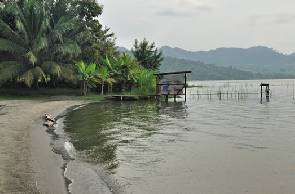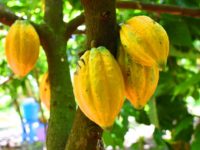
Founder & CEO of Legacy Crop Improvement Centre Mr. Amos Rutherford Azinu is asking farmers in Ghana to adopt new agricultural technologies as well as improved seeds to counter the adverse effects of climatic conditions.
He said Improved hybrid seeds can deliver state of the art technology to farmers: higher yields, disease and pest resistance, climate change adaptation, improved nutrition and longer shelf life.
The Founder & CEO made this disclosure during a Food & Nutrition Security Seminar on the Theme: “Enhancing Hybrid Seed Commercialization in Ghana: The Role of Private Sector in Early Generation Seed (EGS) Production” in Accra. The Food & Nutrition Security Seminar Series was organized by the West Africa Centre for Crop Improvement (WACCI) University of Ghana.
Mr. Rutherford is also a PhD candidate with the Department of Crop Science University of Ghana, working on Development of drought tolerant “Pro Vitamin A” maize hybrids.
“The economic impact of bad climatic conditions has been projected to cost local farmers several thousands of Ghana cedis, the amount is spent on agrochemicals to control the increasing number of pest infestations” he said.
The PhD candidate is calling on farmers to adopt innovative strategies to minimize the impact of Fall Armyworm, the Fall Armyworm has come to stay he added.
He highlighted the need for growers to resort to improved seeds varieties, resistant to the Fall Army Worms and other harmful pests to help improve Ghana’s agricultural sector and ensure food security and boost the economic status of farmers.
He stated that this Impending Global Tsunami forced him to established a private seed enterprise, Legacy Crop Improvement Centre (LCIC) in Koforidua specialized in production and marketing of foundation seeds since the year 2015. According to him LCIC is currently the only private company in Ghana involved in hybrid foundation seed production and marketing. The company operates a 15 acre drip irrigation farm for in-house breeding and line maintenance and has a 30 tons capacity gene bank with cold storage facility and delivers high quality basic seeds to commercial certified seed companies in Ghana, Burkina Faso and Mali” he mentioned.
On his part, President National Seed Trade Association Of Ghana Mr. Thomas Havor whispered that the rural agriculture economy of Ghana is estimated to be operating only at 20% of its potential and thus unable to adequately address the issues of poverty reduction and food insecurity because the sector continues to consist mainly of smallholder farmers using unimproved seeds, fake chemical fertilizers, and have no irrigation facility.
The Global Agricultural Information Network (GAIN) 2018 Report cited by this reporter quoted that Ghana imports food from all over the world to help meet its domestic need. It revealed that Ghana’s major trading partners in include Algeria, Cote d’Ivoire, Egypt, Kenya, Morocco, Senegal, South Africa, Asia, Australia, Europe, North and South America.
The report added Trade data from the U.S. Census Bureau which indicated that the value of U.S. agricultural exports to Ghana in CY 2017 was $103.1 million, an increase of about 49 percent as compared to that recorded in CY 2016 ($69 million).
Mr. Thomas Havor ” the way forward is inclusive governance and transparency at all levels will do the maggic for Ghana” he said .
What do you think about this piece? Share your comment in the comment thread and share the story using the social media buttons above. You may reach the editor on 0249579664. Thank you.





